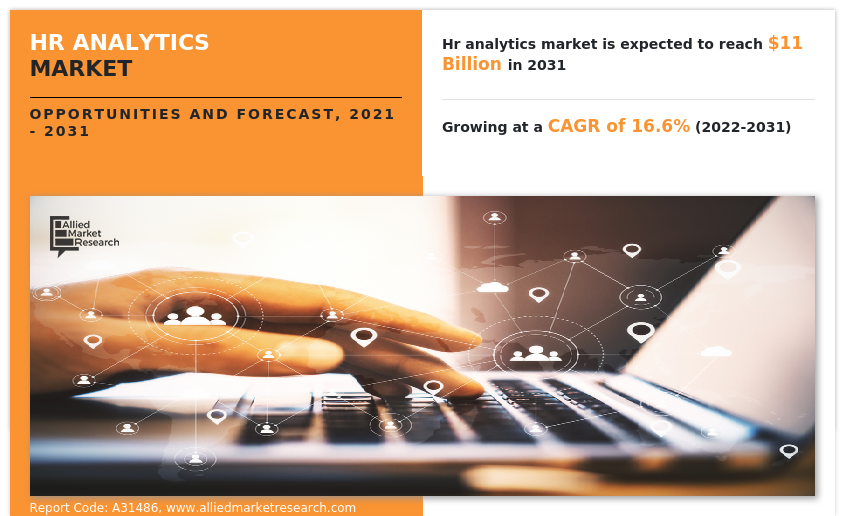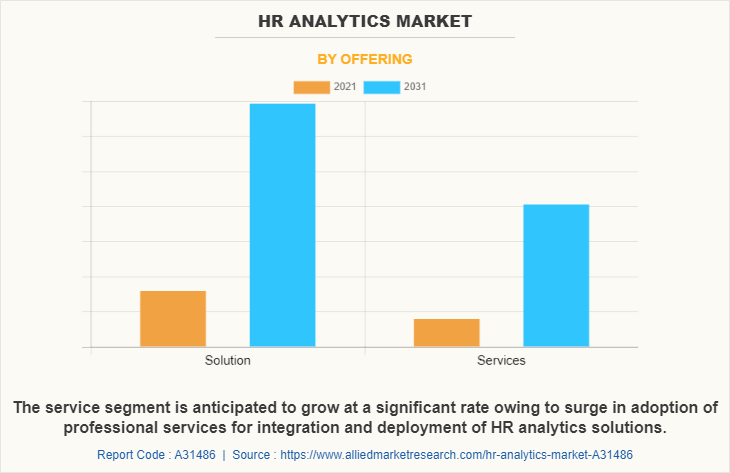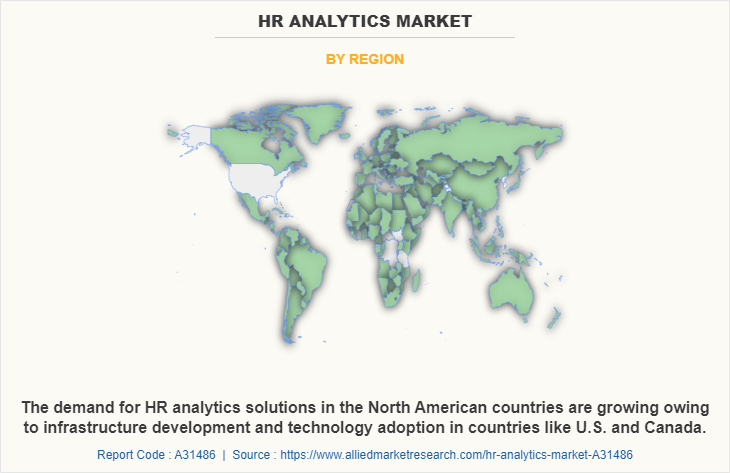HR Analytics Market Insights:
The global HR analytics market size was valued at $2.4 billion in 2021 and is projected to reach $11 billion by 2031, growing at a CAGR of 16.6% from 2022 to 2031.
HR analytics requires business analytics and data mining solutions that analyze data generated by various HR activities such as employee recruitment, training, attendance, engagement performance management, and compensation. Analyzing HR analytics helps to make HR activities more efficient by using collected data to predict key attributes, such as performance, retention, and recruitment. These factors are expected to drive the global HR analytics market growth during the forecast. However, the lack of skilled workforce will hamper the HR analytics industry during the forecast period.

HR analytics involves gathering together, analyzing, and reporting HR data. It enables organization to measure the impact of a range of HR metrics on overall business performance and make decisions based on data. In other words, HR analytics is a data-driven approach toward human resources management.
Segment Review:
The HR analytics market is segmented on the basis of offering, enterprise size, deployment mode, application, industry vertical and region. On the basis of offering, the market is bifurcated into solution and services. Depending on services, the market is divided into professional services and managed services. Depending on professional services, the market is further classified into training & education, integration & deployment, and support & maintenance. By organization size, it is categorized into large enterprises and SMEs.
On the basis of deployment, the market is divided into cloud and on-premise. Depending on application, the market is segregated into candidate recruitment, employee retention, employee learning and development, employee engagement, and workforce management. By industry vertical, the market is fragmented into BFSI, healthcare, retail & E-commerce, manufacturing, IT & telecom, transportation &logistics, media & entertainment, and others. Region-wise, it is analyzed across North America, Europe, Asia-Pacific, and LAMEA.
Some of the major players in the market are Crunchr, Gaininsights, IBM Corporation, Infor, Kronos Incorporated, Microstrategy Incorporated, Oracle Corporation, Sage group PLC, SAP SE, Sisense Inc, Tableau Software Inc, Talentsoft, Visier Inc, Workday Inc, Zoho Corporation, Zoios, and Legartise. These players have adopted various strategies to increase their market penetration and strengthen their position in the HR analytics industry.

By offering, the solutions segment dominated growth of the HR analytics market in 2021, and is expected to maintain its dominance in the upcoming years. The adoption of AI technology and the use of cloud-based HR analytics solutions drive the growth of the solutions segment. However, the services segment is expected to witness highest growth rate during the forecast period. Rise has been witnessed in adoption of HR analytics services among end users as they ensure effective functioning of solutions and platforms throughout the HR process.

North America dominates the HR analytics market. Growth of the market in this region is attributed to several factors, such as increase in digitalization and adoption of HR analytics solutions by the various sectors, such as manufacturing, BFSI, and governments. Moreover, presence of key players provides ample growth opportunities for the market growth. However, Asia-Pacific is expected to witness highest growth rate during the forecast period due to rise in SMEs and digital infrastructure in the region.
The report focuses on growth prospects, restraints, and analysis of the global HR analytics market trends. The study provides Porter’s five forces analysis to understand the impact of various factors, such as bargaining power of suppliers, competitive intensity of competitors, threat of new entrants, threat of substitutes, and bargaining power of buyers on the global HR analytics market share.
Top Impacting Factors:
Increase in automation of HR operations
The future of HR analytics solution depends on powerful and robust integration. HR analytics solution that can effortlessly integrate with other software or tools is essential in today's evolving business environment. Furthermore, the HR payroll industry is focused on advanced technologies, such as artificial intelligence (AI) and blockchain to streamline the business process, which drive the HR analytics market growth.
For instance, in October 2020, TCS launched the TCS Workforce Analytics, an AI-based unified system of engagement, insights, and foresight for employees, managers, and CXOs, designed to enhance productivity and workforce experience. The new solution is designed to help enterprise deal with the talent management challenges of the digital era. Such advance development are expected to drive the growth of the HR analytics market during the forecast period.
Increasing use of cloud-based technology
The demand for cloud-based technology is rising for better security and real-updates. The adoption of cloud by HR administration enables secure, seamless integration between the company’s core HR system. It is more efficient, data-enriched, accessible, and makes the businesses obtain greater visibility globally.
Cloud-based technology empowers all human resource (HR) functions and offers a propelling thrust that boost business performance. Moreover, accountability and transparency in HR services are now much easier to establish due to cloud technology. In addition, it makes easier to collaborate and access all information from anywhere. Furthermore, HR analytics solution provides flexibility and scalability to boost business operations.
Key Benefits for Stakeholders:
The study provides an in-depth analysis of the global HR analytics market forecast along with current & future trends to explain the imminent investment pockets.
Information about key drivers, restraints, & opportunities and their impact analysis on global HR analytics market trends is provided in the report.
The Porter’s five forces analysis illustrates the potency of the buyers and suppliers operating in the industry.
The HR analytics market analysis from 2022 to 2031 is provided to determine the market potential
HR Analytics Market Report Highlights
| Aspects | Details |
| Market Size By 2031 | USD 11 billion |
| Growth Rate | CAGR of 16.6% |
| Forecast period | 2021 - 2031 |
| Report Pages | 345 |
| By Industry Vertical |
|
| By Offering |
|
| By Deployment Model |
|
| By Enterprise Size |
|
| By Application |
|
| By Region |
|
| Key Market Players | INFOR INC, SAP SE, Crunchr, Visier Inc, Microstrategy Incorporated, Kronos Incorporated, Sisense Inc, Legartise, Zoios, Talentsoft, IBM Corporation (U.S.), Oracle Corporation, gaininsights solutions, zoho corporation, Sage Group plc, Workday Inc, Tableau Software Inc |
Analyst Review
In accordance with insights by CXOs of leading companies, the global HR analytics market is projected to witness prominent growth, especially in Asia-Pacific and Europe. This growth is attributed to growing startup culture, desire to improve productivity and performance of employees and companies, and increasing government initiatives to adopt cloud technologies. In addition, organizations in the region are using HR analytics to develop data-driven talent strategies.
The cloud-based segment is expected to show a promising growth rate during the forecast period. The demand for cloud-based HR analytics is increasing due to the rapid adoption of cloud technology in the industry. In addition, this technology provides insight into efficient and rapid processes that increases optimization and competitiveness.
Moreover, enterprises make significant investments in mergers and acquisitions to enhance their existing solutions and deliver new solutions as well as develop automation technologies. For instance, in December 2021, Kronos Incorporated acquired Optimum Solutions, Inc. Optimum’s acquisition by Kronos launches an exciting new chapter for customers and team members. By joining the Kronos family, Optimum’s customers will benefit from the award-winning services, support, and innovations that have propelled Kronos to its position as a leading, global HCM solutions provider. Kronos’ HCM software is unparalleled in the industry and will enable the team to take even greater strides in fostering advancements in technology that drive business results.
Prominent market players explore new technologies and platforms to meet increase in customer demands. Product launches, partnerships, and acquisitions are expected to enable them to expand their product portfolios and penetrate different regions. For instance, In February 2019, Infor partnered with Montage, a provider of HR analytics solutions to engage, interview, and hire better candidates. As per the terms of the partnership, both companies would offer the next generation of predictive talent analytics and interviewing technology for the hiring process by leveraging the capabilities of their respective platforms.
The global HR analytics market size was valued at $ 2,368.46 million in 2021, and is projected to reach $ 10,958.71 million by 2031.
The global HR analytics market is expected to grow at a compound annual growth rate (CAGR) of 16.6% from 2021-2031 to reach $11 billion by 2031
Some of the major players in the market are Crunchr, Gaininsights, IBM Corporation, Infor, Kronos Incorporated, Microstrategy Incorporated, Oracle Corporation, Sage group PLC, SAP SE, Sisense Inc, Tableau Software Inc, Talentsoft, Visier Inc, Workday Inc, Zoho Corporation, Zoios, and Legartise. These players have adopted various strategies to increase their market penetration and strengthen their position in the industry.
North America dominates the HR analytics market. Growth of the market in this region is attributed to several factors, such as increase in digitalization and adoption of HR analytics solutions by the various sectors, such as manufacturing, BFSI, and governments.
HR analytics requires business analytics and data mining solutions that analyze data generated by various HR activities such as employee recruitment, training, attendance, engagement performance management, and compensation. Analyzing HR analytics helps to make HR activities more efficient by using collected data to predict key attributes, such as performance, retention, and recruitment. These factors are expected to drive the global HR analytics market during the forecast.
Loading Table Of Content...



